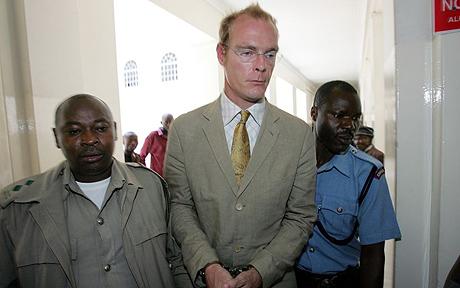White Kenyan aristocrat found guilty of killing black poacher
 Nairobi - A white Kenyan aristocrat was Thursday found guilty of the manslaughter of a black poacher on his estate in 2006.
Nairobi - A white Kenyan aristocrat was Thursday found guilty of the manslaughter of a black poacher on his estate in 2006.
Old Etonian Thomas Cholmondeley, 40, was arrested in June 2006 and charged with murder after Robert Njoya, an unemployed stonemason who was poaching on the
50,000-acre Soysambu ranch in Kenya's Rift Valley, died from a gunshot to his pelvic area that hit an artery.
The prosecution alleged that Cholmondeley, the great-grandson of a British peer who settled in Kenya in the late 19th century, had deliberately shot Njoya,. However, the judge ruled that malice aforethought could not be proven.
"Due to the total circumstances, I reduce the charge of murder to that of manslaughter ... the accused is found guilty of offence of manslaughter," Judge Muga Apondi told the Nairobi High Court.
The judge deferred sentence on Cholmondeley, who has spent three years on remand in the grim Kamiti prison.
It was the second time that Cholmondeley has been charged with murder. He escaped conviction in 2005 after an undercover game ranger was shot dead on his estate.
That first acquittal sparked furious protests from local Masai leaders, who still harbour resentment about what they see as the theft of their land.
Thomas Cholmondeley's great-grandfather, the 3rd Baron Delamare, became one of the leaders of white British settlers and claimed huge swathes of land, including the Soysambu ranch.
In his testimony, Cholmondeley said he came across Njoya and other poachers carrying a slaughtered impala as he travelled the ranch with his friend, rally driver Carl Tundo.
Cholmondeley claimed he that he only opened fire once Njoya and his two friends set their dogs upon him and that he aimed only at the animals. The aristocrat said he shot two dogs dead and opened fire on another.
According to Cholmondeley, it was only after he approached the bodies of the dogs that he saw Njoya, who was bleeding profusely from his wound, lying under a bush.
The defence maintained that Cholmondeley did not deliberately fire on the poachers and that Tundo also opened fire upon the dogs with a pistol.
However, Apondi called the attempt to cast doubt on who fired the fatal shot an "afterthought" and also ruled that forensic evidence proved that Njoya and the two dogs were hit from behind, disproving Cholmondeley's claim he was confronted by the poacher and his dogs.
However, the judge said that Cholmondeley's conduct after he discovered he had shot Njoya helped prove that the shooting was unintentional.
Following the shooting, Cholmondeley used his handkerchief as a tourniquet, called the police and arranged for Njoya to be taken to hospital. (dpa)